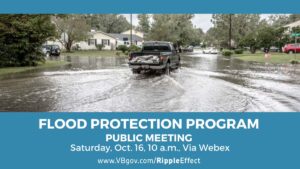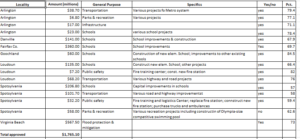 by Dick Hall-Sizemore
by Dick Hall-Sizemore
Local referenda, while important locally, are often overlooked in the media coverage of elections. However, the results of those elections may provide some insight into the mood of the electorate, at least in some areas of the state. Following is a summary of the results of the local referenda on the ballot last Tuesday.
Localities cannot hold a referendum unless authorized or required by state law. The most common referendum question has to do with the issuance of general obligation bonds. The state constitution governs when a referendum is required. Generally speaking, a county cannot issue general obligation bonds unless approved by the voters in a referendum. In contrast, cities and towns are not required to have a referendum. However, some cities have charter provisions restricting how much general obligation debt they can issue. Virginia Beach and Danville, the two cities that held bond referenda this year, fall into this category.
In addition, referenda are allowed or required on a variety of policy questions. This year there were referenda on the levying of additional sales tax, establishment of gambling enterprises, and replacement or relocation of monuments.
Bonds. Voters in eight jurisdictions authorized the issuance of almost $1.8 billion in general obligation debt. Arlington and Spotsylvania counties had the most bond questions on their ballots, four each. In fact, in a sign of Spotsylvania’s continuing transition from a rural county to a suburban, bedroom community, the county’s voters were asked to approve the highest total amount of bonds of any locality, outside of Virginia Beach, this year. The total amount of the bonds on the ballot was $398.7 million (the voters approved $340.7 million).
Virginia Beach had the largest single bond referenda question. In a historic move, the city asked its voters to approve borrowing up to $567.5 million for flood protection and mitigation measures. This issuance was the second largest bond issuance in the country in recent years related to flood protection, second only to the $2.5 billion issued by the city of Houston in the wake of Hurricane Harvey. As pointed out by Virginia Business, “The sea level at Virginia Beach has risen nearly a foot since 1970, and it is expected to rise 3 feet by 2075.” This rise was ascribed to a combination of subsidence and a rise in sea level generally. The result has been recurrent flooding not related to a major incident such as a hurricane.
The city went to great lengths in explaining the proposal to its residents. There was a series of public meetings and details of the proposal on its website. In its explanatory material and announcements leading up to the vote, the city was transparent with voters, explaining that authorizing the issuance would result in a tax increase of 4.3 to 6.4 cents per $100 of assessed value in order to raise the revenue needed for the debt service. The referendum was overwhelmingly approved with 73% voting in favor.
Most of the other bond referenda were related to school funding. The only bond issue that lost was in Spotsylvania. It was for parks and recreation projects, with the centerpiece being an Olympic-sized competitive swimming pool. Almost 63% of the voters turned this one down.
Below is a table listing the bond referenda and results:

Policy issues. Sales tax increases—State law authorizes a locality to increase its sales tax by 1 cent, if the additional funds are used for school construction or renovation and if the increase is approved by the voters in a referendum. This question was put to voters in two localities this year. In Danville, 60% of the voters approved. However, in Pittsylvania County, surrounding Danville, the measure narrowly lost by 44 votes out of more than 25,000 cast.
Monuments—Under state law, a locality may petition the circuit court to order an advisory referendum on the removal, relocation, contextualizing, or covering any publicly owned war monument or memorial. There were three such referenda this year: Middlesex, Mathews, and Nottoway counties. By a majority ranging from 68% to 8o%, the voters in all three localities opposed any removal or relocation of the respective monuments.
Gambling facilities—Before the Virginia Racing Commission may grant a license for a pari-mutuel satellite facility, there must be a referendum in the locality in which it is proposed to be located. In Amherst County, 54% of the voters disapproved of licensing a facility in the county. On the other hand, the voters in Emporia welcomed a satellite facility, with 66% voting “yes”.
In a surprise, in the required referendum, the voters of Richmond narrowly (51.2%) defeated the proposal to locate a casino in the city. Earlier in the year, the city had received three proposals for casinos — two in white areas and one in a Black area in South Richmond along the Rt. 1 corridor. After getting considerable backlash over the ones proposed for white areas, the city settled on the one in South Richmond. The project was billed as the nation’s first Black-owned casino and the developers projected 1,500 new jobs and $50 million in annual tax revenue for the city. Proponents of the project reportedly spent $2 million in promoting its approval in the referendum.
In a sort of reverse-NIMBY vote, voters in the majority white areas of the city killed the proposal, voting 2-1 against it, while Black voters in the area in which the facility would have been located strongly supported it. (See Richmond Times-Dispatch report of outcome here.)


